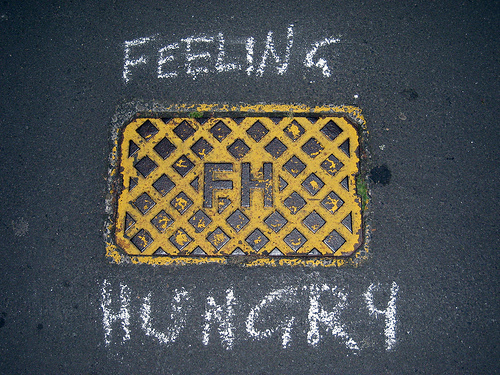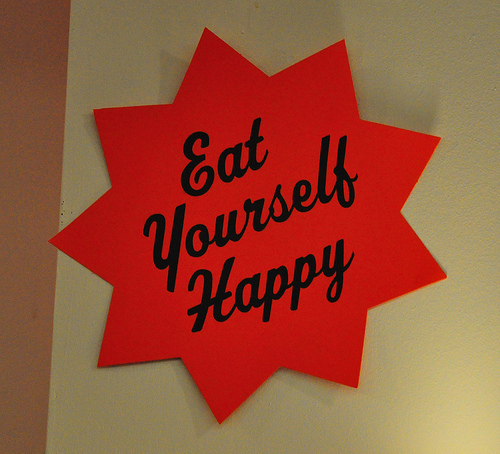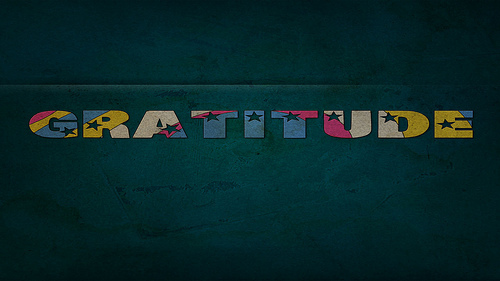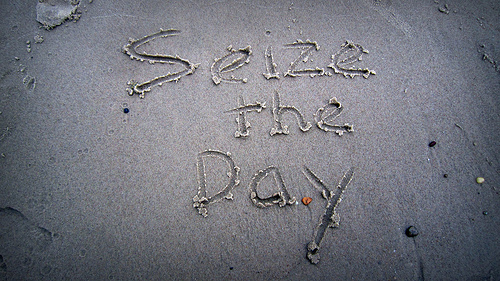Paul Garrigan's Blog, page 26
September 22, 2013
Hunger and 5:2 Intermittent Fasting
I can go months without ever feeling hungry – it’s not something I’m proud of. I’ve developed the dangerous habit of grazing – this means I’m snacking throughout the day so my stomach never really gets empty. My desire to avoid hunger means I’ve been putting my health at risk. My 10 weeks of 5:2 intermittent fasting is to help me develop a new relationship with hunger.
Inability to Recognize Hunger
It is understandable that humans would want to avoid hunger – this is the way the body tells us we need to eat soon. If we ignore this warning for too long, we die. The problem is that most of us experience hunger so infrequently that we lose our ability to recognize it.
When I try to eat away my emotions it just makes me feel miserable. I don’t need anyone to convince me of the dangers of comfort eating. The problem is that most of the time I don’t even realize that this is what I am doing. This happens because I mistake other emotions for hunger.
It came as a real surprise to me a few years ago to find out that I frequently mistook feeling bored or feeling tired for feeling hungry. I’d experience these emotions and automatically go to the fridge. It was only when I began experimenting with mindful eating that I discovered this misperception.
The Danger of Eating to Avoid Hunger
There is a huge difference between eating because we are hungry and eating to avoid hunger. If we never get hungry, it must mean we are constantly grazing. We are eating too much so it is hardly surprising when we put on weight. It also leads to other problems like type 2 diabetes (if there is always sugar in our bloodstream, we need to be constantly producing insulin).
It is true what they say about hunger being a tasty sauce. During my twenties and thirties, I’d often skip meals because of work. Feeling hunger was almost a daily occurrence for me back then, but it never felt like a big deal – in fact, I loved going to eat on an empty stomach. I’d no worries about my weight in those days, and I’d always plenty of energy.
5:2 Intermittent Fasting to Develop a New Relationship with Hunger
I think one of the real benefits of all forms of fasting is that it teaches us to stop being a wuss around hunger. We discover we can go hours and hours without eating and nothing bad happens to us. Hunger pains come and go but they are really not that big a deal. It is not the discomfort of hunger pains that is the problem here – it is the fear of that discomfort.
I’m fasting again today (number 5), and I’m not bothered one bit at the idea of feeling hungry later on – that’s real progress for me. Friday was my last fasting day, and I didn’t feel hungry at all until the very last hour.
I’ve had people congratulate me on going 24-hours without food, but it really isn’t much of a challenge at all. I know my body can easily tolerate it, and I trust the experts who say it is doing me some good. Even if the only benefit of 5:2 intermittent fasting is changing my relationship with hunger, it will be well worth it.
Click on the highlighted text to read more about my experiences with 5:2 intermittent fasting and juice fasting
September 21, 2013
Three Important Lessons I Gained From Working as a Nurse
My six year old son has started to tell people that I used to be a doctor. I understand his confusion – the idea of a male nurse just doesn’t exist here in Thailand. If he tells people that I used to be a พยาบาล (pronounced ‘pha yaa baan’), they just laugh and say that he must mean หมอ (pronounced ‘maaw’).
Up until the age of 25, I assumed that any man who worked as a nurse had to be gay. My views changed when I started volunteering as a friend to a young guy with profound learning disabilities. I’d been a completely selfish-shit up until this point in my life, but I experience such joy doing volunteer work that I decided to become a nurse.
Entering the nursing profession turned out to be one of the best decisions of my life. It changed me, and I’m a much better person because of it. I now work as a freelance writer (my dream job), but I still pay my fees every year to stay registered as a nurse. I’ll probably never get the chance to work in the profession again, and this is one of my few regrets.
My career as a nurse lasted 14 years. I only worked full-time for three years after qualifying as an RGN. For the last seven years of my nursing career I lived in Thailand but would return to Ireland for about three months of the year to work like a maniac. I’d do six 12-hour night-shifts a week as an agency nurse, and I’d earn enough to live comfortable in Thailand for the rest of the year.
I gave up nursing reluctantly because I started to feel unsafe. I knew that only working three months of the year made it hard for me to keep my skills and knowledge up-to-date. I wouldn’t be able to live with myself if something bad happened to a patient due to my incompetence, so I’ve had to stop practicing.
Here are just some of the most important lessons I gained from working as a nurse:
Sometimes the Best Thing You Can Do is to Listen
Until I began working as a nurse, I would feel extremely uncomfortable when talking to anyone experiencing a serious health problem. I’d just say something patronizing like ‘you’ll be fine’ or ‘we’re all dying anyway’, and I’d try to change the subject as quickly as possible. I didn’t know what else to say. I didn’t understand that this person probably only needed me to listen.
When I began working as an agency nurse in Ireland, I picked up a lot of work in hospices and palliative care units. I found working with the dying to be stressful but also extremely rewarding. I did the night shift, and this is when people are most likely to pass away – we could have as many as four people dying within a few hours of each other.
The night is when the terminally ill can become most fearful and eager for company. It always felt uncomfortable, but I got better at sitting there and listening to what these people were saying. It seemed to help them to talk, and I’d nothing better to offer them than my ear.
I can be a real chatter-box, and I had to learn how to listen. One of my nursing tutors from Bart’s in London (where I trained) gave me a great tip that I continue to use today. I try to count to ten after somebody has stopped talking before I say something. I can then use this time to think about what I’m going to say, so I’m not doing this while they are still talking (it is impossible to really listen while you are thinking about what you are going to say).
I think most people who are worried are looking for somebody to listen rather than to tell them what to do. It just makes things easier if we can get the shit out of our heads – sometimes the answer becomes obvious by just talking about the problem.
Trust Your Intuition
I don’t know how intuition works – I only know that it does. Nurses tend to have great intuition, and it can save lives. There were so many times when I just got a strong feeling that something wasn’t right with one of my patients. I’d check their vital signs and everything would be fine, but this feeling that they were about to ‘go off’ would persist.
Experienced doctors tend to trust the intuition of nurses. There were many times when I bleeped one of them to come and review a patient despite there being no obvious signs of anything amiss. These hunches usually turned out to be correct because the patient would start to suddenly go downhill – often while the doctor was still on their way to the ward.
I always seem to pay a heavy price for ignoring my intuitions about things. I remember when I first began working as freelance writer, a client scammed me out of a lot of money – I provided them with work they never paid for. This client came across as very charming, but I just sensed something was amiss – I ignored this feeling so I paid the price.
Never Lie to Somebody to Make Them Feel Better
When I was still a nursing student, I annoyed an orthopedic surgeon because I lied to his patient. I felt upset at the time at being told off, but he was completely right to do it. We were trying to move somebody with two broken legs onto a trolley. I told the patient ‘don’t worry, it’s not going to hurt’ – of course it turned out to be a few seconds of pure agony for the guy.
At the time, I wouldn’t have considered what I did as lying. I just wanted to help the patient calm down and feel a bit better. I didn’t realize that by doing this I’d be losing their trust – not only their trust in me but maybe all nurses.
I wouldn’t like somebody to lie to me just to make me feel better. I can work with the truth but lies are just going to get in the way. Sometimes it’s best to say nothing at all.
How to Use the Entrepreneurial Spirit to Quit Alcohol
In this video and podcast, I discuss how we can use the entrepreneurial spirit to escape alcoholism and build a great life. Nothing too good is likely to happen to us while we remain in our comfort zone, we need to go out there and take action
Press play to listen to the podcast edition of this episode:
September 20, 2013
5:2 Intermittent Fasting for Weight Loss
One explanation for the popularity of 5:2 fasting is the tempting idea that we can eat what we want for five days of the week without any weight gain. No eating for two days is a great bargain if you can enjoy guilt-free munching for the rest of the time – in my experience it doesn’t quite work like that.
It is Possible to Gain Weight on a 5:2 Fasting Diet
Last August I tried 5:2 intermittent fasting for the first time. I felt inspired after watching a Horizon documentary called ‘Eat, Fast, and Live Longer’. It seemed like an easy way to lose weight while at the same time reducing my risk of developing cardiovascular disease, diabetes, and certain cancers.
I remember one scene from the Horizon documentary when the presenter (Michael Mosley) drove up to a drive-in-takeaway to enjoy a nice feast. He gobbled his food without the slightest embarrassment because he had reached the end of his fast.
I don’t think the makers of the documentary intended to promote the idea that regularly eating junk food can be safe, but this is the bait that grabbed my attention. I loved the idea- I would eat without constraint for five days a week, fast for two days, and get the satisfaction of seeing the number on the weighing scales steadily decrease.
In the beginning I did lose weight on the 5:2 intermittent fasting diet – despite making no attempt to control my food intake on normal days. By the third week I’d lost 2 kg (4.4 pounds), but then my weight loss slowed down significantly. The biggest shock came on my fourteenth fast day (week seven) when my weight increased by 0.4 kg (just under a pound).
I couldn’t understand how I could be not eating for two days (losing about 5,000 calories from my diet), yet still putting on weight. I felt disillusioned and gave up.
My Second Attempt at 5:2 Intermittent Fasting
I am now in my second week of 5:2 intermittent fasting – today is my fourth twenty-four hour fast. I’ve no idea how much weight I’m losing because I’ve made the decision not to weigh myself until the end of the ten weeks. I’m hoping to lose about 4 kg (8.8 pounds). The main thing is to change my eating patterns so any weight loss is sustainable after the fast is over.
I’m approaching things a bit differently with this attempt at intermittent fasting. I no longer believe that this diet makes my body immune to junk food – I’m being careful about what I eat even on my normal days.
I’m also building up my exercise regime so that by the end of the 10 weeks, I’ll be burning enough calories that way to make up for the loss of at least one of the fast days. I’m also considering trying juice fasting for one day a week indefinitely.
Click on the highlighted text to read more about my experiences with 5:2 intermittent fasting and juice fasting
September 19, 2013
How Optimism Kills More Alcoholics than Liver Disease
Alcoholics tend to be exceptionally optimistic – they have to be in order to keep doing what they are doing.
Most of us are probably not going to automatically associate the word ‘optimism’ with addiction to alcohol. I must admit, my memories of being a drunk mostly involve depression and feeling hopeless – especially for the last few years of my drinking.
Here’s the thing – there is no way that I would have allowed my life to deteriorate to such a degree without plenty of optimism to get me there. No pessimist would put that much effort into doing something that caused them such a high degree of suffering along the way.
I’m not a masochist – I don’t like pain. Most of the fun had gone out of alcohol by the time I hit my first treatment center at age nineteen. It took me another sixteen years before I could finally give it up forever. For all that time I held onto the idea that the good days of drinking were going to return – that’s incredibly optimistic.
Alcoholic’s Top Ten of Optimism
Here are just ten optimistic ideas that help to make alcoholism possible:
1. The good days of drinking are going to return
2. I’ll be able to change when things get bad enough
3. If I don’t drink until the evening, I’ll be fine
4. I’m one of those ‘high-functioning’ alcoholics
5. It is going to be easier to keep drinking than to change my life
6. I’ll stop drinking when I’m older
7. If I stop drinking for X days/weeks/months/years, I’ll be safe to drink again
8. This online webinar is going to teach me how to drink sensibly – it only costs $500!
9. If I move to an exotic country, I’ll be better able to control my drinking
10. My new girlfriend/boyfriend is going to help me get better
Drunks and Their Terminal Uniqueness
It’s not easy to remain optimistic when there is so much evidence that you have gone off the rails – alcoholics manage to pull this off with great aplomb. The secret to their tenacity is called ‘terminal uniqueness’ – it is called ‘terminal’ because this type of thinking gets you killed.
Terminal uniqueness is optimism in its most lethal form. It’s a type of magical thinking that most of us will engage in at least occasionally. People who come here to Thailand and ride a motorbike without a helmet are exhibiting terminal uniqueness – so is the person who thinks they can get away with smoking cigarettes.
To understand how terminal uniqueness works, we need to take a look at cognitive dissonance. This is just a fancy term for something most of know already – people are capable of believing any old shit if it justifies what the things they want to do.
Even the most uninformed alcoholic knows that drinking too much alcohol is a dangerous type of behavior. This knowledge that they are doing something so illogical makes them feel uncomfortable – this is what cognitive dissonance means.
One way that we can resolve cognitive dissonance is to believe that the normal rules do not apply in this case. The alcohol-enthusiast decides that they are somehow protected from the usual consequences of excessive drinking.
The optimism of terminal uniqueness can be almost bulletproof to reason – so much positive thinking would put Tony Robbins to shame. Even as our skin turns yellow, and our abdomen swells from liver cirrhosis, we can still imagine there to be great days of drinking ahead of us – that takes an incredible amount of optimism.
September 17, 2013
Gratitude is the Best Stress Buster Ever
Do you think it is possible to feel grateful while at the same time experiencing a high degree of stress in your life?
I don’t believe this is possible. I’d go so far as to say that my periods of high-stress are always associated with a lack of gratitude. I can only feel stressed when I’m focusing on what I don’t have rather than what I do have.
New Agers and Their Gratitude Lists
I’ve tended to feel a bit cynical at any mention of keeping a gratitude list – or even worse, a gratitude journal. It always sounded a bit too much like tree-hugging for my comfort levels. The old me would have worried that writing a gratitude list would be opening the door to vision boards and magic crystals.
I have written gratitude lists in the past –albeit reluctantly. During that period of my life when the only holidays I ever took were to go to rehab, I’d usually be expected to do some type of gratitude list as part of the program. I always resented doing it because I saw it as ‘busy-work’ – writing for the sake of writing.
I’ve mellowed out a lot since hitting middle-age. I guess my years of struggling against the flow in life have managed to wear down some of my rough edges. I no longer automatically dismiss something because it sounds a bit ‘new age’.
I still haven’t started a gratitude list, but I am using the same principles in a new way.
Feeling Grateful Every Day
I mentioned on here yesterday that my motivation and feelings of positivity have shot through the roof since I began experimenting with fasting. Taking control of my diet has greatly increased my energy levels – it has also encouraged me to introduce some new routines into my life and one of these is being grateful.
In another post on here a couple of weeks ago, I mentioned my goal to achieve financial security by age 50. I’m going to need to stay motivated and focused to make this happen, so I’ve introduced a new ritual into my life – it doesn’t involve a vision board, but it is kind of similar.
At least twice a day (I use my iPad to remind me), I take a few moments to remember all the good things in my life:
I think about my son, my wife, my career as a writer (dream job), my dog, my car (I didn’t even learn to drive until I hit 37), and how wonderful it is that I live in a beautiful country like Thailand.
I’ve got so many wonderful things in my life, but up until now they haven’t been appreciated because I’ve been so focused on getting more.
Once I’m feeling suitably grateful, I next focus my attention on my achievements. There have been periods of my life when I’ve been a complete shit, but I’ve always been my own harshest critic. My low self-esteem has meant that I’ve felt uncomfortable with any praise or claps on the back – even from myself.
I now know it is vital for me to honor my own achievements by acknowledging them. It is this that turns my gratitude into motivation.
As part of my daily ritual:
I remember the pride of holding my son in my arms for the first time. I relive the experience of walking into the most popular book store in my home country to not only see my book on display, but to also have customers ask me to sign it. I also think back to the wonderful morning in June 2006 when I checked out of a rehab here in Thailand knowing that I’d never drink alcohol again.
I probably spend less than a minute thinking of all these wonderful things in my life, but it really gets my juices going.
Next I turn my attention to the future:
I picture how great it is going to feel to be financially secure – the peace of mind of knowing that I’m taking care of my family. I also think about the satisfaction I’m going to get from being successful in my career – the pride of knowing that I’m doing everything in my power to reach my potential.
I’ve always tended to aim low in life. I remember during my nursing training, I’d only ever do enough on my assignments to pass. I didn’t want to try to my best at anything in case I failed – failure is much easier to cope with when you know you could have done better.
I perform this ritual twice a day to increase my motivation. For the first time in my life I’m going to give 100 per cent. Not because I’m ungrateful for the things in my life right now but because pushing my limits is one of the most satisfying things I’ve ever done.
Gratitude to Beat Stress
My life up until recently has been full and stress and worry – I’ve been like a beggar with a ‘feed me’ sign who doesn’t see that he is sitting on a mountain of gold. My inability to appreciate all the good in my life has meant that I haven’t been able really enjoy anything – no wonder I get stressed and depressed.
If you are feeling too much stress in your life, could it be due to lack of gratitude? The truth is that no matter how bad things get, there is always stuff to feel grateful for – you know the old saying, every day above ground is a good day.
September 16, 2013
Fasting Diet for Motivation
Do you get plenty of great ideas for how to improve your life, but you just don’t have the motivation to take action?
Maybe some type of fasting diet can provide the extra bit of energy you need to get things done.
Most people I know are going to answer with an emphatic ‘yes’ to the question above. These individuals are sure to have convincing justifications to explain their lack of motivation – too much work, not enough time,too many commitments blah, blah, blah – but there are plenty of guys out there achieving amazing things despite the busyness of their schedule.
Up until recently my lack of motivation has been holding me back in life. I do get periods of high-energy but it hasn’t been enough to allow my to achieve many of my important goals (e.g. financial security). Something has changed for me recently, I’ve been experimenting with fasting (juice fasting and 5:2 intermittent fasting), and my motivation and energy levels have shot through the roof.
Fasting to Increase Motivation
I wouldn’t have believed it possible, but I’ve just had 30-days straight of feeling positive and full of energy. I’ve been able to significantly increase my work output, and I’ve still had enough spare energy to take on those extra tasks (the ones that can improve my life) that I felt too busy to make time for before – it is like the more I do, the more I’m capable of doing. If I didn’t know better, I’d suspect my wife of slipping some extra-powerful amphetamine into my coffee.
The thing that makes this month of abundant positivity and energy even more surprising is it coincides with my fasting experiments. Over a month ago I began a fifteen day juice fast, and I’m now in the second week of a 10-week 5:2 intermittent fast. It seems logical to expect my energy levels to plummet by denying myself food, but the complete opposite has happened.
Fasting to Reduce Depression
I’ve suffered from mild depression for years – it is like a black cloud always out there waiting to rain on my day. I’ve become much better at managing my symptoms, but I’d rather not have to deal with them at all.
I try to keep track of my moods, and I usually have at least a day or two a month when I feel down. I not experience low moods at all during the last month, and it sort of feels like that part of my life is over. It is hard to explain how I know this, but it just feels undeniably true – almost like how I felt seven years ago when I realized my alcohol problems were over. I’m not trying to claim that my future is going to be free from bad days – of course not – but it just feels like the black cloud is gone, and it’s not going to come back.
Fasting is No Magic Cure
I don’t want to suggest that it is just the fasting diet alone that has led to my increased motivation and reduced moodiness. I tried juice fasting and intermittent fasting last year, and I didn’t seem to get much from these experiences at all – I gave up on the 15 day juice fast after 10 days, and I quit on my 10 weeks of intermittent fasting after seven weeks.
I think what this latest period of fasting has done is given my life a much needed nudge in the right direction, and this has made it possible for other things to come together for me. I felt so great after the fifteen day juice fast, and it has created a domino effect in my life.
I feel super-positive about the future, and I’ve become full of gratitude for what I already have in my life.
I can’t promise that other people are going to experience the same results as I did, but this can be a life-changing experience. I like to look at this period of fasting as a time of renewal and that’s exactly what if feels like. I’ve been renewed, and I’m now ready to take my life to a new level.
September 14, 2013
From Walking to Running at Dawn on Mae Ramphung Beach
I posted on here in May about my evenings walks on Mae Ramphung beach here in Rayong. This continues to be my favorite and most productive time of day – it gets me energized and positive.
Dawn on Mae Ramphung Beach
I’ve made a few changes to my routine on Mae Ramphung. I’d been walking in the afternoons, but I’ve changed the time to 05:30 am – I’m now on the beach each morning before sunrise.
My initial reason for changing from afternoons to mornings was the weather. It is now the rainy season in Thailand, and if I wait until the afternoon the weather is often too bad to walk. If it is raining in the morning, I still have the option of going later on.
Walking in the afternoons gave me a great tan but after living in hot counties for over thirteen years, this isn’t such a big deal to me. I’d much rather be pale and reduce my risk of developing skin cancer – I’m also saving money on sunscreen creams and hats by walking first thing in the morning.
I originally intended to just do these early morning walks until the end of the rainy season, but it is such a wonderful time of day to be on the beach that I plan to stick to this time. My concern that a long walk before breakfast would mean I’d be tired for the rest of the day is mistaken – I’ve now far more energy than ever.
Mae Ramphung beach isn’t ideally located for sunrises – the eastern side of nearby Samet Island is the best place to go for this. There is something really special about this time of the morning on the beach, and I’ve started taking pictures that I post to my Facebook page.
From Walking to Running on Mae Ramphung
I had been walking for ninety minutes of the beach, but I have the type of body that needs hard exercise. I’m slowly building up to an hour or running each time, and I’m going to do this for five or six mornings per week.
I’m a bit out of shape, but it felt really tempting to try to run an hour from the first day. I stopped myself doing this because I know it can too easily lead to injury and loss of motivation. I started off with five one-minute runs, and I’m not at five three-minute runs.
It feels like I’m holding back by building up slowly, but it is helping me develop the running habit again. It is going to take another eight weeks before I’m up to the full-hour.
My exercise program also fits in nicely with my ten weeks of 5:2 intermittent fasting. It means that by the end of this period of fasting there will be something in place to help me maintain my weight.
The Meaning of Mae Ramphung
I’m always interested in how places in Thailand get their names. I’ve asked a few people about the history of the name ‘Mae Ramphung’, but I haven’t received any illuminating responses yet.
Mae (แม่) means ‘mother’ in Thai and ramphung (รำพึง) can be a person’s name or it can mean ‘to grieve’. So I’m not sure if Mae Ramphung (แม่รำพึง) means ‘Mother Ramphung’s Beach’ or ‘grieving mother beach’. If anyone has any suggestions, please leave a comment.
September 13, 2013
Escape Alcoholism by Becoming a New Person
In this video and podcast I discuss the secret of escaping alcoholism – if you want your life to change, you need to change who you are. I remained trapped in addiction for many years because it felt too easy to remain in my comfort zone. I finally began changing my approach to life and as a consequence my life began to change.
Press play to listen to the podcast edition of this episode:
Intermittent Fasting and Coffee
Intermittent fasting would be more of a challenge for me if I wasn’t able to have a couple of nice cups of coffee on those days when I’m not eating. I did wonder if consuming caffeinated beverages might be cheating, but it seems to be a common practice.
Calories in Black Coffee
I prefer milky coffee, but I stick to the black stuff on those days when I’m fasting. This means that the number of the calories in this drink will be negligible – instead of the 20 or so calories in the milky version.
I’d always assumed that black coffee didn’t contain any calories, but it turns out the brewed stuff (like I drink) contains about 2 calories per cup. I probably burn more than that carrying my cup from the kitchen, so I’m not going to worry too much about it.
I recently read Eat, Fast, Slim: The Life-Changing Fasting Diet for Amazing Weight Loss and Optimum Health by Amanda Hamilton, and she says that drinking coffee temporarily boosts metabolism. This is another reason for why I’m not worried about the 2 calories in my cup.
by Amanda Hamilton, and she says that drinking coffee temporarily boosts metabolism. This is another reason for why I’m not worried about the 2 calories in my cup.
Drinking Coffee when Juice Fasting
I didn’t drink coffee at all during my 15 day juice fast. I wanted to give my body a good cleanout so consuming cup after cup of this drink would have been counterproductive.
I normally go through about six or seven large mugs of coffee a day. I did worry about developing withdrawal symptoms during my juice fast. I avoided this by permitting myself to drink green tea. Other than a bit of a headache on the first day, I didn’t notice any caffeine withdrawals.
I suppose I had about five cups of green tea on the first day of my juice fast, but by the sixth day I didn’t feel the need for it anymore. I cut down to one cup. It turned out to be an effective way to avoid the withdrawals I normally get when I stop drinking coffee
Drinking Coffee When Intermittent Fasting
There doesn’t seem to be much of a problem with drinking one or two cups of coffee when fasting. I made the mistake of drinking too many cups on my last fast day, and I felt a bit nauseous – it felt acidy in my empty stomach.
Today I’ve reduced my coffee intake to a couple of cups. I’ve also been drinking black tea, and a healthy beverage I make by adding bits of real ginger to hot water.
Second Fast Day of My First Week of 5:2 Intermittent Fasting
I had my 500 calorie meal (2 homemade beef burgers with no bread) at 08:30 am. I’m now seven hours into my second fast day, and I feel alert and energised.
I’ll probably get a few hunger pains later on when my wife and son are eating their dinner, but this isn’t such a big deal for me anymore. I enjoy the feeling of control over my body – it is empowering to know that I don’t need to be a slave to my appetite.
Last year I tried to do 10 weeks of intermittent fasting followed by juice fasting. I think it has worked out better this time because I did the juice fast first of all – a twenty-four fast doesn’t feel like much after 15 days of juice fasting.
Paul Garrigan's Blog
- Paul Garrigan's profile
- 3 followers













